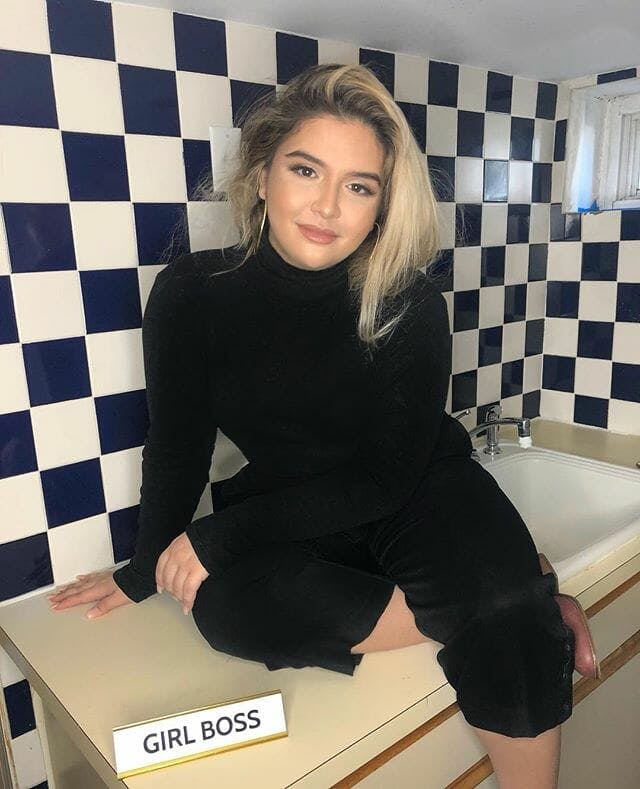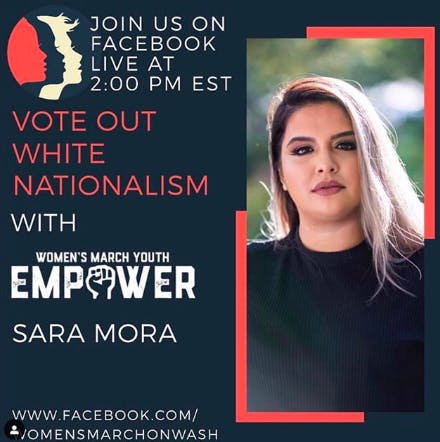For generations, the immigrant story was a tale of pride: the accomplishment of you, or an ancestor, coming to the country with nothing and “pulling yourself up by the bootstraps.”
Obviously, individual stories are more complicated than that. And a strong sense of pride doesn’t negate the deep, dangerous prejudice that immigrants face in the United States, especially if your skin color is black or brown. While the sentiment that immigrants, citizens or otherwise, are un-American or “lesser than” is nothing new, it has definitely been inflamed since President Donald Trump hit the campaign trail in 2015.
Over the past three years, the country has witnessed its leader call immigrants “murderers and rapists,” their home countries “shit hole[s].” He has instituted policies banning immigrants from Muslim-majority countries and separating children from their families at the Mexican border. In the meantime, this messaging has spread, empowering his supporters to yell at people of color to “speak English” and “go back where you came from.” Videos of racist rhetoric and violence go viral too many times a day and are too many to count.
That’s why, these days, the immigrant story of pride has taken a different, more urgent tone.
Publicly declaring your immigration status has become a bittersweet political message in the face of its life-threatening consequences. On YouTube, beauty bloggers have broken their tutorial routines to share how, as immigrants, they were forced to assimilate in the U.S. On Instagram, Deferred Action for Childhood Arrivals (DACA) recipients have posted photos of their graduation caps, decorated to reflect their heritage and celebrate their future, with hashtags like #HereToStay. Content creators are wearing their statuses proudly, pushing for political change, and challenging racist headlines about their communities.
The Daily Dot recently talked to Antonio Arellano, Shannon Boodram, and Sara Mora—just a few in a growing number of immigrant influencers—about how impossible it is to separate your social media game from your identity as an immigrant in 2019.
The informant: Antonio Arellano
Scroll through Antonio Arellano’s Instagram, and you’ll find often-smiley, sometimes-dapper portraits of the 28-year-old Houstonian, captioned with inspirational phrases like “Collectively we are truly unstoppable” and “Stand tall in the face of overwhelming odds.” On Twitter, however, the communications director for the Latinx youth activist group Jolt is more outwardly political.
“Congress needs to do an exhaustive investigation into the medical care and health care given to undocumented immigrants after they are taken into U.S custody,” he tweeted last month. “Immigrants are not receiving the proper care and are being mistreated by customs and border patrol.”
He has embraced his role as a human rights advocate for the LGBTQ and immigrant communities in Texas, sharing information and events that focus on changing politics in the state and beyond. Arellano himself is a DACA recipient, moving to Houston from Michoacán, Mexico, when he was 3 years old.
Arellano said that sharing immigration news, and his opinions about it, has allowed him to build an audience and become a resource and authority on social media; he has nearly 100,000 followers. Between the news and commentary, he tries to make his content “culturally infused,” writing in both English and Spanish, with the goal of opening social movements to more people across the immigrant and queer communities.
“I think that social media is a tool that our ancestors could have only dreamt of,” Arellano said. “While it’s cool to share memes and funny content, if we really prioritize the messaging behind our dissemination on social media, we could not just impact our communities, but change the world. You don’t have to be an elected official or an American citizen to spark change.”
Arellano has expanded his efforts nationally by creating a group with other advocates called USA Latinx. With a sizable 20,000-account Twitter following, USA Latinx aims to include gender non-conforming Latinx people in the dialogue on issues affecting them nationwide.
The group funded a billboard featuring Trump’s negative tweets about Sen. Ted Cruz (R-Texas) leading up to the midterms. Along with Parkland shooting survivor David Hogg and activist Claude Taylor, Arellano and USA Latinx raised more than $9,000 to put Trump’s previous disparaging tweets about Cruz on a mobile billboard, making stops at various political events in the state, including at least one of the debates between Cruz and his Democratic challenger, Beto O’Rourke.
Across Twitter, people loved the massive troll at both Trump’s and Cruz’s expense, gawking at the toxic ways in which each needed the other to succeed.
The success that Arellano has found with his online following has come with negatives, of course. He has received numerous threats of death and deportation. Because of this, he’s careful to not share too much about his family and friends, but he tends to leave dissenters unblocked, giving them an opportunity to continue to learn from what he has to say.
“I will continue to speak out regardless of the opposition, because this is greater than me,” Arellano said. “It hurts to not be able to live a quote-unquote normal life in that regard, but that’s what the work is for—to make sure that going forward people can be visible without feeling fear of oppression and discrimination.”
It is here where being both social media famous and an activist overlap: You often have to put yourself on the line, expose yourself to the worst of humanity, if you want your message to connect to the culture at large.
The documentarian: Shan Boodram
As the host of Facebook’s Make Up or Break Up, sexologist Shan Boodram, known to her followers as Shan Boody, helps people navigate relationship problems. On her own feeds, she doesn’t shy away from sharing stories about herself and her husband, either (the pair were just married last month). But no one’s life is one-dimensional, and her posts and videos don’t stop there. In 2014, Boodram immigrated to the United States from Canada, following her parents’ lead—her father’s family is from Guyana, her mother’s from Dominica. Being an immigrant is a large part of her identity, one she doesn’t erase on social media.
Boodram said that she saw the move to the U.S. as a rite of passage, following in the steps of her grandmother. Boodram came to the U.S. on an O-1 visa, a type designated for people with “extraordinary abilities” in certain fields, or who, in her case as a TV host, have a “demonstrated record of extraordinary achievement in the motion picture or television industry and has been recognized nationally or internationally for those achievements.” Her visa process, which she described as “the most ridiculous,” took a year and a half and required multiple book-length applications, including vetting and character references from colleagues.
In 2016, as her visa neared expiration, Boodram applied for a green card to give her permanent residency in the country. He green card was approved in October, less than a month before Trump won the presidential election. At the time, Boodram said that she didn’t think anything of it.
“I don’t think anyone thought [Trump] was going to win, and so my mindset wasn’t, ‘Things are going to massively change.’ Already under the Obama administration, it was really difficult,” Boodram said. “At the end of the day, you’re asking for a number to run in like a 400-million-person race. You’re not getting any special advantages—in fact, it’s the complete opposite. But you just want an opportunity to make it big in the country that has big opportunities.”
While she was lucky to qualify as an “extraordinary applicant,” Boodram’s citizenship journey still came with its own set of challenges. On her visa, Boodram was limited to only take on jobs that she had been pre-approved to do, such as TV hosting, which disqualified her from earning a living with part-time jobs unrelated to her work. The financial strain was a burden, especially while trying to move into an apartment without credit: At one place, she was told she would have to pay three times the usual deposit. To make matters worse, she needed to retake her driver’s license training in a city that revolves around driving, rendering her temporarily unable to shuttle herself to the utility offices to set up her accounts and payments, which she couldn’t set up over the phone or online. At one point, she called her father in tears, but he told her: If your grandmother did it with less access to resources and less education, then you can make it happen, too.
While going through the green card process, she wanted to document the difficulty as a resource for others making their own adjustments to living in the United States. (She made a video specifically about her visa process, too.) When Boodram meets other people trying to get their green cards, she refers them to her immigration lawyer and tries to make herself available for advice, in hopes she can make the process a little more bearable.
“My identity as an immigrant really has shaped my work ethic and my attitude about living in America, period,” Boodram said. “It’s just a different standpoint of someone who has literally paid to be here and who has invested to have a shot at it versus someone who I think was just born [here]. And so I have a deeper appreciation for this country in a way that I’m not sure the average person from here necessarily mirrors.”
The “freeloading” or “criminal” immigrant narrative is one the Trump administration has been tirelessly pushing. That’s why it’s vital for documentarians like Boodram to show that immigrants will do what it takes to be here legally, even though there is nothing simple about the process.
The organizer: Sara Mora
While immigrants are often regarded as brave for speaking out against the Trump administration’s anti-immigration policies and rhetoric, 22-year-old Sara Mora doesn’t know any other way to be. A digital native who’s been on social media since she was a teen, she often used her platform as she does now—posting motivational messages to her followers as if she had an audience of tens of thousands.
Her tone changed in 2017, however, when Trump moved to rescind the DACA program, which allows Mora and fellow recipients to live and work in the U.S. legally without being deported. The New Jersey-based organizer and branding consultant grew a following for her DACA-specific activism and was suddenly given access to the kind of opportunities that would make those dreams possible, such as meeting state Sens. Cory Booker and Bob Menendez, and creating social media campaigns in support of DACA.
“I don’t think there was a process [to my social media audience growth] because it was me being very desperate [about DACA],” she said. “It was also really empowering to see that [support], because I felt like I didn’t have to be scared. I think naturally, most people aren’t just going to bust out and say, ‘Hey, look, I’m undocumented, yaaay, I’m undocumented and unafraid,’ especially not in the area we live in.”
Mora said that despite the reach she’s gained over the past few years—with opportunities to be on CNN, to work with Teen Vogue and the shoe company Toms, and to be the co-president of the youth faction of the Women’s March called Youth Empower—she didn’t plan on doing this kind of work at a scale as large as she is now. But everything she posts on her Instagram is intentional, from her media appearances to the more personal content featuring her family and her own challenges. One day, she wants to run for office.
While she acknowledges her success is thanks in part to the attention she’s gained around her DACA status, she doesn’t want to be defined by it. She’s grateful that her work to represent DACA recipients and immigrants has given her access to the career she has now, but she’s sometimes frustrated by the way that the media will credit her creativity and work ethic to her status instead of her intellect and talents.
“The reason that I had access to certain things was because of my vision with marketing, so now the following and the platform obviously adds to that, but I don’t necessarily think the platform itself gave me the career,” Mora said. “People are going to say, ‘Oh, because you’re a DACA recipient, you’re going to do things,’ and it’s not right. People see ‘undocumented,’ people see ‘DACA,’ but when I sit down for [different events], it’s interesting to see how much less stress is put on that side of who I am.”
Mora advises other young people interested in being social media influencers for a cause to be clear and transparent about what they represent. They should really believe in the messages they stand for. There are so many people trying to make a difference, Mora says, but not all for the right reasons.
“Right now, it’s kind of in style to be an influencer, but there’s a lot of work that goes behind standing for the cause,” she says. “I’m accountable for the way that I choose to represent causes, too. You just have to believe that you can make a difference. Be intentional and be authentic. They don’t want anybody who sounds like they’re reading a script.”
In an era when everyone wants to be Insta-famous, influencers can get a lot of flak for what they do—whether they’re seen as sell-outs for cheesy brands, or wannabe Kardashians hocking subpar goods. But Mora and her cohorts prove that when their brand is their message, and their message is at the core of who they are, the ad dollars will follow. In turn, companies, and the general public, are forced to reckon with a demand for change.







